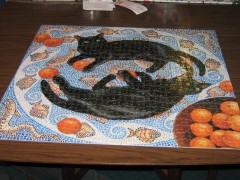Back to church again today - it is so unbelievably good to be back among these people whom I love and who love me. Kind of odd to sit in the 'pews' rather than be up front, especially during the Communion, but a good kind of odd I think.
Last Sunday I sat in the 'Snug' today I sat in the 'central block', over the coming weeks I will sit 'behind the choir' and 'near the door' to see what they feel like. And to see what church looks like from those perspectives. I don't mean just physically, I mean from the perspectives of the people who choose to sit in those areas of the Gathering Place.
Long ago, when I had a traditional church building with fixed seating, I used to go in early on a Sunday and sit in different people's places. The purpose was (at least) two-fold. I would think of the person who sat in that chair/pew (we had both!) and what was happening n their world, so far as I knew; so it became a way of focussing prayer. I could also see church from their place, physcially certainly, but also arising from the thinking I'd already done... if this is happening for so-and-so then how might church feel/look today?
Usually when I am preaching at the Gathering Place I go on fairly early and sometimes have enough time before anyone arrives to do a similar exercise. It is also useful sometimes to try to imagine how it all feels to a visitor - practically, emptionally, spiritually. What 'givens' might confuse visitors? What do we take for granted?
A useful exercise for any of us to do now and then whether or not we preach. Just trying to view church from someone else's perspective makes us all a little more gracious!
